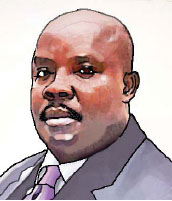Aba in its present comatose state, speaks of irresponsibility on contemporary political leadership and administration in Abia State.
By Emeka Alex Duru
(08054103327, nwaukpala@yahoo.com)

If Aba, the commercial nerve centre of Abia State and indeed, the South East, were to be a human being, it would have been fit for an epitaph; “Here lies a great man, who was frustrated by his worthless children”.
I am yet to come to terms with the photographs and videos my cousin sent to me on the state of the roads and streets of Aba metropolis that I knew. I have heard and read comments on the piteous state of the city. But I could not have imagined that the decay could be this deep and disturbing.
Growing up, I knew Aba sufficiently. From Victoria, Lagos and Ibere Streets, all in Ngwa Road, through to Cameroon Road, where we lived at various points, it was easy for us, young lads, to run rounds up to other flanks of the city as St. Michaels, Obohia, Ohanku, School, Jubilee, Faulks, Asa, Hospital, Faulks and Port Harcourt Roads.
READ ALSO:
Abia, an unfortunate state governed by drunkards, says Senator Adeyemi
It was usually fun, but at the risk of being caught by the parents, sneaking into Dan Fodio Road, sauntering into Enyimba (Aba Township) Stadium and hitching a ride on rented bicycles for few pieces of coins. On weekends, the temptation would always be strong to loiter around Scotland Crescent, steal a view of Chief Osita Osadebey, Oliver De Coque, Apostles Rock Group, Oriental Brothers, Paulson Kalu or any of the reigning music stars performing in Hotel De Unicoco, a top rate joint, then. Patex Cinema was also a good alternative.
The adventures were possible because of the placid environment and security that was more or less, taken for granted. The administration of the great Michael Iheonukara (M.I) Okpara of the defunct Eastern Region, took time to plan Aba and hoisted it on an enviable height with seductive network of roads, streets and other social infrastructure.
There were also factories and industries to complement the success story of the town. The most prominent ones were Aba Textile Mills, Aba Glass Factory and Ceramic Industry. The sense of order and opportunities in the city encouraged Nigerian Breweries to establish a plant in Aba. There were other facilities that made life easy.
Dr. (Dee) Sam Onunaka Mbakwe, governor of old Imo State continued from where M.I stopped by making commendable efforts to restore Aba to the original masterplan which the military regimes that ruled the country between 1966 and 1979, had distorted. Besides, his frontal attack on the Ndiegoro flood menace, which earned him the sobriquet “weeping governor”, his people-oriented governance remains a sacrifice that Aba residents do not forget in a hurry.
Today, Aba is a nightmare; literally a wasteland, lacking heroes and models. In place of good roads and streets, swamps and craters have taken over. The city is virtually, desolate. There is hardly any social amenity of sort that can be pointed at in the city.
There is no how the sorry story of the present day Aba can be told without linking it to the obvious leadership failure in the south east, particularly Abia state. As in Aba, other cities in the south east are at various levels of dilapidation. The sad reality of Aba and other townships in Abia and other states in the region is that their progressive decay is taking place at the time sons and daughters of the area are in the helm of affairs.
That of Aba is more worrisome because the city, at some points, represented to the average Igbo, a melting point – cosmopolitan village square of sort. Then, it was difficult, if not impossible to count an Igbo family that did not have one of its own residing in Enyimba City.
Aba was a place that encapsulated the never-say-die entrepreneurial spirit of the Igbo. It had a setting where the resolve and unity of purpose by the people for a noble cause could easily be guaranteed. Two slogans spoke eloquently of Aba philosophy; ‘Nzogbu, nzogbu, Enyimba, Enyi’ – a call for action and ‘Aba ma Ndi-Aba’ – Aba knows its own. The latter meant more than it sounded on the surface.
“Aba ma Ndi-Aba”, a popular expression among residents came handy on purpose, often in appreciating virtues, even when the subject was not from the city.
It was in this respect that late Igbo leader, Dim Chukwuemeka Odumegwu-Ojukwu, remained a hero to Aba residents. The people, not given to sycophancy, recalled how the Biafran leader literally put his life on the line in defence of his kinsmen, at the time it mattered most. It was thus, hardly surprising that when he died, Aba residents insisted on his lying-in-state in Aba Township Stadium where they paid him last respect.
Similar appreciation of favour was extended to the Second Republic politician, Adeniran Ogunsanya, chairman of the defunct Nigeria Peoples Party (NPP), for identifying with the Igbo at their hour of need. At his death, in fact, not only were the markets in Aba shut, buses were chartered for traders and workers to travel to Lagos to pay him last respect. It is on such occasions that the Aba ma ndi-Aba mantra would be appreciated.
Conversely, those that failed the people, were booed or stoned in the city. Justice, in Aba, was transparent and instantaneous.
When the iconic Chinua Achebe in his insightful work, “The Trouble With Nigeria”, described the Igbo as being receptive to change and highly competitive, he probably, had Aba in mind. Aba was a unique environment, a centre of opportunities, where a cart pusher or night soil man (onye oburu nshi), by dint of hard work and providence could rise to be a merchant or captain of industries.
That Aba, with such exciting profile, could now slip to the level of a dungeon, raped and abandoned by a succession of managers who ordinarily could be said to be its own, rankles exceedingly.
It will be hard to discuss the present comatose state of Aba without pushing substantial part of the blame to the present administration of Governor Victor Okezie Ikpeazu. Agreed, the rot did not commence in his time. He inherited it. But that is not reason to allow the decay to endure or progress. Governance, they say, is a continuum. Just as a regime inherits the assets of its predecessor, it also assumes responsibilities on ground.
Aba is in Ikpeazu’s Abia South senatorial district. Repositioning the city would have addressed the complaints of marginalisation which his Ngwa kinsmen had cried before his election. There is no volume of efforts or resources spent in recovering Aba that can be termed a waste. Properly harnessed, the wealth of the city can even make the revenue profile of Abia the envy of other states.
But the Governor seems to have ignored these facts. It is not too late to make amends. He still has some months in office to make marks in the city, no matter how marginal they may be. Failure to give the city the desired uplift, may remain a blot that he will live with, even out of office.
Same goes to all the Abia elders, political elite and religious leaders, who choose to keep quiet, play to the gallery, or run shows with successive governments in the state while Aba and other towns, go down by the day.














